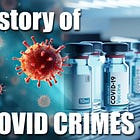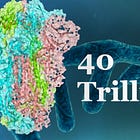Post-Injection Treatment
Exploring fasting, supplements, and repurposed medicines as strategies to counter spike protein and injection harm
In part four of my presentation to Morinville, I explain that the damage of the injections is not simple or uniform; it is layered, complex, and still unfolding. There is no quick fix, no miracle pill, and no magic protocol that can erase what has been done. However, this does not mean there is no hope. By understanding how these injections harm the body and by committing to disciplined, practical strategies, it is possible to mitigate some of the effects and improve one’s health.
Please support the Trozzi Team’s mission to drive solution-oriented research, raise awareness, empower the public, and foster meaningful change through dedicated grassroots efforts.
Honest approaches Needed
When desperation is high, opportunists move in. Many people look for a single product to undo the harms of the injections, but real healing takes discipline and patience. Any true solution must be rooted in physiology and the reality of the situation.
Not all “vaccine” batches were the same. Some proved far more dangerous, with reports of entire care facilities devastated overnight. Others were improperly stored, weakening the toxic payload. Unfortunately, surviving the early phase does not guarantee safety. Autoimmune diseases, immune collapse, and cancers are now appearing, meaning everyone must take the risks seriously.
Targeting the spike protein
The spike protein is a central driver of toxicity. One of the most effective and accessible ways to reduce its impact is fasting. Both intermittent fasting and longer water fasts activate autophagy, the body’s natural process of breaking down old proteins and damaged cells. This not only clears harmful debris such as the spike protein but can also help reset the immune system.
Key points on fasting and autophagy:
Intermittent fasting limits food intake to a 6–8 hour window each day, with only water, black coffee, or plain tea outside that window.
Longer water fasts of three to five days push autophagy more deeply, clearing old cells and proteins while nearly resetting the immune system.
Women of childbearing age should extend the eating window slightly during ovulation or menstruation.
Children should maintain at least a 12-hour eating window due to their faster metabolisms and higher energy needs.
Type 1 diabetics must use caution, as fasting requires careful balance with insulin use.
Supplements with proven benefits
Several compounds also show promise in addressing the spike protein, mitigating both blood clotting and inflammation.
Nattokinase: Derived from fermented soybeans, it helps dissolve clots and break down spike protein.
Bromelain: Found in pineapples, it reduces inflammation and assists protein breakdown.
NAC (N-acetylcysteine): A potent antioxidant that blocks spike protein binding and eases inflammation.
Curcumin with piperine: Turmeric’s active component, enhanced by black pepper, fights fibrosis and inflammation.
Repurposed medicines under attack
Ivermectin, once recognized as one of the world’s essential medicines, has antiviral and spike-binding properties. Hydroxychloroquine, long used safely for rheumatologic conditions, works in tandem with zinc to inhibit viral replication and modulate autoimmune reactions. These safe, established drugs were smeared during the “pandemic” to protect the narrative that injections were the only option.
Shedding and long-term vigilance
Evidence suggests that spike protein shedding is real, with un-injected individuals reporting illness after exposure to injected family or friends. While full genetic transfer appears rare, the fact remains: humanity has been subjected to a reckless experiment. The path forward is vigilance, detoxification, and the rebuilding of health and trust.









Shedding is definitely a real thing. In August 2021, when I went to have my teeth cleaned the dental hygienist told me not to worry that she was all up to date with her injections. I told her I wasn't worried and that my immune system was strong. The next day, I started to bleed even though I had not had a period for seven years. The bleeding stopped after three days but I had severe menstrual cramps for eight months!! I followed the protocol that Dr. Trozzi mentioned in this post and finally the cramps went away.